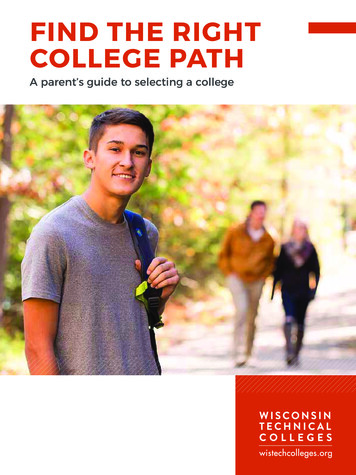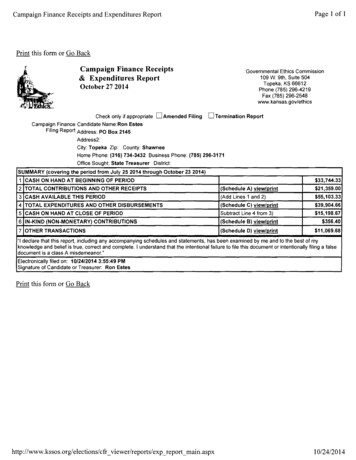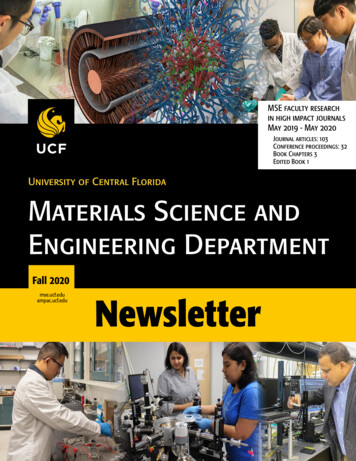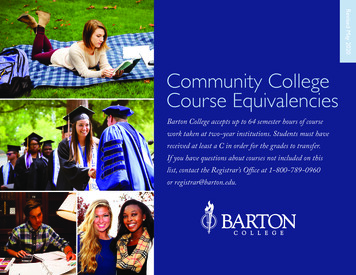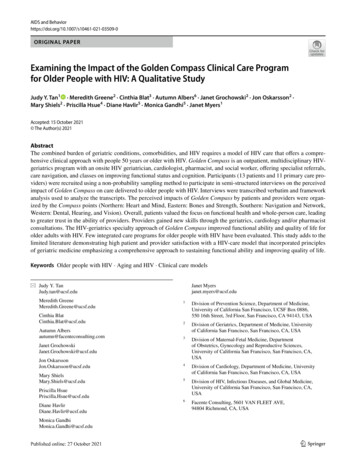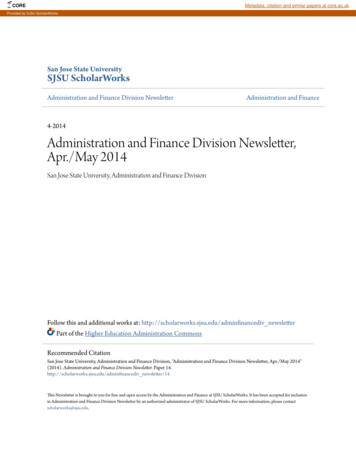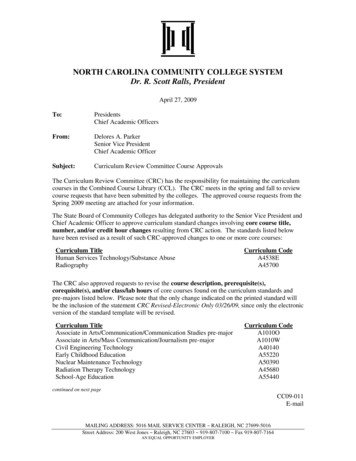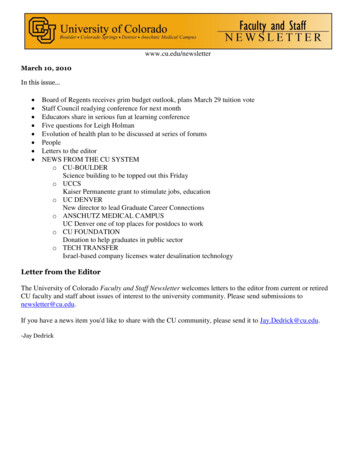
Transcription
www.cu.edu/newsletterMarch 10, 2010In this issue Board of Regents receives grim budget outlook, plans March 29 tuition voteStaff Council readying conference for next monthEducators share in serious fun at learning conferenceFive questions for Leigh HolmanEvolution of health plan to be discussed at series of forumsPeopleLetters to the editorNEWS FROM THE CU SYSTEMo CU-BOULDERScience building to be topped out this Fridayo UCCSKaiser Permanente grant to stimulate jobs, educationo UC DENVERNew director to lead Graduate Career Connectionso ANSCHUTZ MEDICAL CAMPUSUC Denver one of top places for postdocs to worko CU FOUNDATIONDonation to help graduates in public sectoro TECH TRANSFERIsrael-based company licenses water desalination technologyLetter from the EditorThe University of Colorado Faculty and Staff Newsletter welcomes letters to the editor from current or retiredCU faculty and staff about issues of interest to the university community. Please send submissions tonewsletter@cu.edu.If you have a news item you'd like to share with the CU community, please send it to Jay.Dedrick@cu.edu.-Jay Dedrick
Board of Regents receives grim budget outlook, plans March 29tuition voteBoard hears recommendations to raise tuition up to 9 percentBy Deborah Méndez-WilsonThe University of Colorado system is considering a proposal to raise tuition starting this fall by up to 9 percentfor resident undergraduate students on three of its campuses.During a special meeting today in Denver, the CU Board of Regents received a grim budget overview for theuniversity, and scheduled a March 29 tuition-setting meeting on the UC Denver Downtown Campus. Theregents said they wanted more time to gather input and public comment from students, faculty and staff beforevoting on the proposed tuition increases.―We need time to communicate with students and faculty,‖ said Regent Michael Carrigan, D-Denver.The proposal to raise tuition for resident undergraduate students in Boulder, Colorado Springs and Denver is inline with the 9 percent cap set by Gov. Bill Ritter earlier this year. Among other goals, the proposed tuitionincreases would help the university offset a severe state funding shortfall, maintain the quality of its academicprograms and student services, and keep its pool of institutional financial aid for low- and middle-incomestudents, administrators said.If the board increases tuition by up to 9 percent, it would translate into a 580 annual increase for the averageCollege of Arts & Sciences resident undergraduate student at CU-Boulder; 504 at UC Denver; and 420 atUCCS.State cuts to higher education have made it difficult for CU and other Colorado universities to avoid broachingthe idea of tuition increases to help fill their funding gaps.Since July, CU has watched its state funding plummet by 58 percent, down from 209 million to 88 million,and administrators believe it is likely to continue to decline as state lawmakers struggle to balance the state’sbudget amid declining tax revenues. Under a worst-case scenario, the university is projecting a funding gap of 170 million through fiscal year 2012.The CU system is addressing its funding shortfall through continued budget cuts, greater administrativeefficiencies and revenue enhancements, but the university might not be able to rely on significant state supportin the future, said Kelly Fox, vice president and chief financial officer for the CU system.―The state is still grappling with this idea that higher education could be looking at zero funding, or a verylimited pool of funding,‖ she told the regents during her budget overview.The university currently is backfilling its budget shortfall with federal stimulus funding that will run out at theend of the 2011 fiscal year. Fox told the regents that a recent report indicated that Colorado’s universities aremore reliant on stimulus dollars than other institutions around the country, an indication that they have absorbedmore cuts proportionately than their peers.California is next highest on the list for state educational systems that are relying on stimulus dollars to stay in business,“and we’ve seen the headlines in California,” Fox said. “It’s a serious situation there.”
Staff Council readying conference for next monthService Excellence Award winners chosen at March 4 meetingBy Cynthia PasqualeRecipients of the annual Service Excellence Award were selected at the Thursday, March 4, meeting of theUniversity of Colorado Staff Council. The awards recognize individuals who have provided outstandingvolunteer service to their campus, community/civic/professional activities and the university.Four recipients – one each from the Boulder, Colorado Springs and Denver campuses and one from systemadministration – were selected from submitted nominations. The names won't be announced until April 16,when chancellors from each campus and President Bruce D. Benson will introduce the awardees during the AllStaff Council Conference in Boulder. Each recipient will receive a 1,000 cash prize.The conference also includes a leadership workshop, breakfast and lunch, campus reports and a presentation onthe CU-Boulder Center for Community, an under-construction building that will include a student center, diningarea and student services.Also during the staff council meeting, E. Jill Pollock, senior associate vice president and chief human resourcesofficer, discussed the university's move to benefits self-funding. The plan, which would allow the university tobetter manage health benefit plans, could cut costs over time from 3 percent to 8 percent annually, she said.Self-funding also would allow the university to design health plans that fit the needs of employees.In addition, Pollock said, a complete benefits review is under way to compare what CU offers, including tuitionwaivers, with what other organizations with whom CU compares offer. She said surveys may be conducted tofind out about services desired by employees in order to determine if group plans are feasible.The university also is focused on a wellness and prevention program that would begin with a voluntary healthrisk assessment that employees could complete online. Pollock said studies show such assessments, along withmedical management programs, can reduce health costs over time by up to 3 percent, slow the rate of increasein health plan rates and cut down on absenteeism. About 1 percent of the money received from employee andemployer medical premiums would go to the health and wellness program."This is a great opportunity for the University of Colorado, and by extension, the state of Colorado, to lead thenation" in improving the health of its people, she said.In other business, Dan Montez, director of the Office of Policy and Efficiency, said the Task Force onEfficiency continues to review university policies and within the next few months will complete policiesconcerning alternative work schedules, leave sharing and use of alcoholic beverages at university events.
Educators share in serious fun at learning conferenceEvent sponsored by President's Teaching Scholars Program brings 100 together to talk shopBy Jay DedrickSome 100 faculty members from throughout theUniversity of Colorado system gathered Friday,March 5, to talk shop at the President's TeachingScholars Program (PTSP) conference. Thedaylong lineup of presentations and paneldiscussions took aim at the topic "How OurStudents Learn: Implications for Faculty."The unofficial theme might have been "SeriousFun," thanks to presentations that mingledplayfulness with scholarship. In theirpresentation on teaching procedural skills,husband-and-wife Matt and Katie Rustici,second-year residents at the Anschutz MedicalPhoto/Caroline SeibCampus, showed a clip from the TV comedy"Scrubs" and handed out toddler shoes to theaudience for an exercise in automated processes. CU President Bruce D. Benson, second from left; his wife, MarcyBenson, center; and Mary Ann Shea, director of the President'sIt turned out that tying a shoe with your nondominant hand is a much more difficult task than Teaching Scholars Program, chat with attendees of the program'simagined.sponsored conference on Friday, March 5, at the AnschutzMedical Campus. The daylong event consisted of presentationsand panel discussions on the topic "How Our Students Learn:Implications for Faculty."Ed Rivers, professor and President's Teaching Scholarwith the English department at CU-Boulder, tinkeredwith Apple's Garage Band program to show how themetaphorical right brain and left brain can be putinto action simultaneously. The program, whichenables easy composition of music via canned loopsand sounds, can lead to revelatory communication,he said: One student's seemingly senselesscacophony of videogame music and effects turnedPhoto/Caroline Seib out to be an articulation of what it feels like toendure bipolar disorder.Professor Ed Rivers of the English department at the University ofColorado at Boulder presents a session during the President's"I was very moved by the project and by theTeaching Scholars Program conference. He demonstrated Apple's student's expression," Rivers said.Garage Band program to show how its use relies on theFor the day's plenary address, Jerry Rudy,metaphorical left and right sides of the brain.psychology professor at CU-Boulder, took theaudience on a fantastic voyage of sorts with his
"Hitchhiker's Guide to How the Brain Learns and Remembers." Slides and animation showed how memoriesform like popcorn erupting on spiny neurons. He discussed what sounds like science fiction: erasure of specificmemories from the mind. It's real science that's currently being researched, hesaid.The event also featured serious contemplation, such as four professors from theUniversity of Colorado at Colorado Springs, all women of color, who led a paneldiscussion on the challenges such educators face."What do you need to look like, speak like, dress like . for students torespect your authority?" said Rashna B. Singh, an English professor. LyndaDickson, a sociology professor, related the story of a critical "e-mail fromhell" sent by a student, and the ensuing question it raises: Is the criticismracially motivated?Marty Bickman, professor and President's Teaching Scholar with the Englishdepartment at CU-Boulder, showed the other end of the spectrum during hispresentation, "How Our Students Learn: Why Not Ask Them?" He led a panelof three Boulder graduate students who also teach; they talked abouteducators and students working together. "It seems to me we ought to allywith our students," Bickman said.Photo/Caroline SeibJudy Strathearn said it's a good idea for grad students to teach "because we're onboth sides of the fence." Her advice to educators: "Be who you are every day whenyou walk into the classroom," she said. "Let (students) see who you really are."The event opened with a welcome from Mary Ann Shea, director of thePTSP, a presidential initiative that endorses excellence in teaching byhonoring faculty throughout the university who excel in teaching, scholarshipand research. CU President Bruce D. Benson also spoke and answeredquestions, including one about his own time as an undergraduate at CUBoulder.Professor Jerry Rudy of the psychologydepartment at the University of Colorado atBoulder lectures during the plenary session atthe President's Teaching Scholar Programconference at the Anschutz Medical Campus. Inhis talk, "The Hitchhiker's Guide to How theBrain Learns and Remembers," he discussedthe process of forming memories and the newpossibility of deleting specific memories."I had a wonderful experience," Benson said, noting that he was "not apartying guy.""I had great professors," he added, mentioning Bruce Curtis as his adviser andfavorite professor. In 2002, after Benson and his wife, Marcy, made adonation to the CU-Boulder Museum of Natural History, the building wasrenamed the Bruce Curtis Building in honor of the professor emeritus.Professor Lynda Dickson of theUniversity of Colorado at ColoradoSprings sociology department addressesthe audience during "Teaching Back:When 'true speaking' in the classroom isseen as threat," a panel discussionduring the President's Teaching ScholarProgram (PTSP) conference at theAnschutz Medical Campus on Friday,March 5. Photo/Caroline Seib
From 2006 to 2009, Leigh Holman served as director of the Opera Colorado Ensemble Artists, stagingproductions and developing the program's young artists. Since last June, she's worked with the student artists atthe University of Colorado at Boulder, where she's director of CU Opera. CU-Boulder also is where she earnedher doctorate in musical arts; her bachelor's degree in music is from the University of Southern California. Themezzo-soprano also earned a graduate opera performance degree on full fellowship from the Eastman School ofMusic. She previously served as chair of the voice and opera studies area at the University of Arkansas at LittleRock, where she founded an opera program.Photo by Caroline Seib
The stage director's latest production, Mozart's Leigh Holman, lower right, puts performers through their paces during"Don Giovanni," plays at Macky Auditoriuma rehearsal for "Don Giovanni," her second production as stagefrom Friday, March 12, through Sunday, Marchdirector for CU Opera. Performances begin on Friday, March 12.14. In April, she'll helm CU Opera's "Our Town,"an American work that's just a few years old. Inbetween the two stagings, she might find some free time to go hiking or motorcycle riding with her husband, a BoulderHigh School guidance counselor. At the moment, though, a certain Don Juan is occupying most of her time.— Jay DedrickWhat makes Mozart's "Don Giovanni" relevant to audiences in 2010?The opera was written in the 1700s, and the play is from the 1600s, but it's still about real people and theheartbreaks we get through in life. The story's relevant in the sense that people are people. We can relate tothese people who have been harmed and hurt and who grow throughout.It's the story of Don Juan: He's drawn to the obsession of seducing women and it overtakes him. The audiencecan be hard-pressed to relate to Don Giovanni. He seems to be evil. I don't perceive him as evil; in his mind, Idon't think he has a choice.Mozart is the ultimate dramatist in the sense that his music, not just the text, really evokes a human emotion.His music is relevant no matter the time period because he's a genius. An evening out, going to the opera andhearing the music of Mozart is really special. I don't want to jinx it, but we're having some of the best ticketsales CU has had in years. It could be because of the quality of students, performers and designers, and it alsocould be that people are starting to choose what they think is worth spending their money on, choosing whatthey think is important.What led you from Opera Colorado to CU Opera?When this professional job with Opera Colorado came up, I knew it was going to be a great stepping stone tothe job I really wanted, which was to be with a great university in a great opera program. For two years, I wasthe director of Opera Colorado's young artist program, which is an apprenticeship program for up-and-comingopera singers. Now I'm directing and teaching acting to singers, and I'm just thrilled to be here. I got a doctoratein order to pursue a career in academia, so this is really my dream job.This is your second CU Opera production in your current position, following "La Traviata" last fall.Even though you're an experienced professional, did you learn anything from your first CU productionthat's helping you this time?Actually, I did. In the professional world, rehearsals are done so quickly because everyone's done their roleseveral times before. In the academic setting, we have time to really dig into it and think about how to learn arole. In "Traviata," I tried something new and had the singers translate each of the Italian words into English,and then put it into their own words in modern language, to help them really understand every single thingthey're saying.It helped to make the drama so much more immediate. So we did that again with "Don Giovanni." For example,if Giovanni is saying something that would translate to, "Women are the air that I breathe and the depth of myexistence," the actor would say something in his own words, like, "I don't think of anything in the world exceptwomen. Food doesn't matter, drink doesn't matter. I just think about my next conquest." The performers aregetting out of the poetic and making it their own.
This summer you're launching the CU New Opera Workshop, where composers will come to Boulder andtake part in workshops with students. How did this come about?It's an idea I got from my time at Opera Colorado. When I was there, the National Performing Arts Conferencewas in Denver, and the National Opera Conference included a new works sampler. I had the opportunity towork with young artists from Opera Colorado and the Central City Opera, and I really enjoyed directing themand seeing them get into American opera.If we don't support living composers, the art form will die. My intention at Opera Colorado was to start to usethat as framework and do performances of new works every year. When I left, I took the idea with me. Itactually works even better in an academic setting, because it really is study of new works.This summer will be a real workshop situation. Composers will be composing for the students' voices. They getto try it out and get their work off the page and into voice.You're set to direct "Rigoletto" in Cento, Italy, next January. Is it intimidating to know you'll be stagingan opera in the birthplace of opera?It is. It is intimidating and exhilarating, exciting and challenging. What's most exciting is that I'll be using theItalian language to direct with. In music, you learn a lot of "love" words in Italian. And in Italian class, youlearn, "Where is the bathroom?" and "May I order a beer?" But speaking Italian to Italian singers, saying, "Hey,come down stage right" and "Let's evoke sensuality." That's exciting and new for me. So I'll be submersingmyself in Italian this summer.Want to suggest a faculty or staff member for Five Questions? Please e-mail Jay.Dedrick@cu.edu
From 2006 to 2009, Leigh Holman served as director of the Opera Colorado Ensemble Artists, stagingproductions and developing the program's young artists. Since last June, she's worked with the student artists atthe University of Colorado at Boulder, where she's director of CU Opera. CU-Boulder also is where she earnedher doctorate in musical arts; her bachelor's degree in music is from the University of Southern California. Themezzo-soprano also earned a graduate opera performance degree on full fellowship from the Eastman School ofMusic. She previously served as chair of the voice and opera studies area at the University of Arkansas at LittleRock, where she founded an opera program.
The stage director's latest production, Mozart's"Don Giovanni," plays at Macky Auditoriumfrom Friday, March 12, through Sunday, March14. In April, she'll helm CU Opera's "Our Town,"an American work that's just a few years old. Inbetween the two stagings, she might find somefree time to go hiking or motorcycle riding withher husband, a Boulder High School guidancecounselor. At the moment, though, a certainDon Juan is occupying most of her time.— Jay DedrickPhoto by Caroline SeibLeigh Holman, lower right, puts performers through their paces duringWhat makes Mozart's "Don Giovanni"a rehearsal for "Don Giovanni," her second production as stagerelevant to audiences in 2010?director for CU Opera. Performances begin on Friday, March 12.The opera was written in the 1700s, and theplay is from the 1600s, but it's still aboutreal people and the heartbreaks we getthrough in life. The story's relevant in the sense that people are people. We can relate to these people who havebeen harmed and hurt and who grow throughout.It's the story of Don Juan: He's drawn to the obsession of seducing women and it overtakes him. The audiencecan be hard-pressed to relate to Don Giovanni. He seems to be evil. I don't perceive him as evil; in his mind, Idon't think he has a choice.Mozart is the ultimate dramatist in the sense that his music, not just the text, really evokes a human emotion.His music is relevant no matter the time period because he's a genius. An evening out, going to the opera andhearing the music of Mozart is really special. I don't want to jinx it, but we're having some of the best ticketsales CU has had in years. It could be because of the quality of students, performers and designers, and it alsocould be that people are starting to choose what they think is worth spending their money on, choosing whatthey think is important.What led you from Opera Colorado to CU Opera?When this professional job with Opera Colorado came up, I knew it was going to be a great stepping stone tothe job I really wanted, which was to be with a great university in a great opera program. For two years, I wasthe director of Opera Colorado's young artist program, which is an apprenticeship program for up-and-comingopera singers. Now I'm directing and teaching acting to singers, and I'm just thrilled to be here. I got a doctoratein order to pursue a career in academia, so this is really my dream job.This is your second CU Opera production in your current position, following "La Traviata" last fall.Even though you're an experienced professional, did you learn anything from your first CU productionthat's helping you this time?Actually, I did. In the professional world, rehearsals are done so quickly because everyone's done their roleseveral times before. In the academic setting, we have time to really dig into it and think about how to learn arole. In "Traviata," I tried something new and had the singers translate each of the Italian words into English,and then put it into their own words in modern language, to help them really understand every single thingthey're saying.
It helped to make the drama so much more immediate. So we did that again with "Don Giovanni." For example,if Giovanni is saying something that would translate to, "Women are the air that I breathe and the depth of myexistence," the actor would say something in his own words, like, "I don't think of anything in the world exceptwomen. Food doesn't matter, drink doesn't matter. I just think about my next conquest." The performers aregetting out of the poetic and making it their own.This summer you're launching the CU New Opera Workshop, where composers will come to Boulder andtake part in workshops with students. How did this come about?It's an idea I got from my time at Opera Colorado. When I was there, the National Performing Arts Conferencewas in Denver, and the National Opera Conference included a new works sampler. I had the opportunity towork with young artists from Opera Colorado and the Central City Opera, and I really enjoyed directing themand seeing them get into American opera.If we don't support living composers, the art form will die. My intention at Opera Colorado was to start to usethat as framework and do performances of new works every year. When I left, I took the idea with me. Itactually works even better in an academic setting, because it really is study of new works.This summer will be a real workshop situation. Composers will be composing for the students' voices. They getto try it out and get their work off the page and into voice.You're set to direct "Rigoletto" in Cento, Italy, next January. Is it intimidating to know you'll be stagingan opera in the birthplace of opera?It is. It is intimidating and exhilarating, exciting and challenging. What's most exciting is that I'll be using theItalian language to direct with. In music, you learn a lot of "love" words in Italian. And in Italian class, youlearn, "Where is the bathroom?" and "May I order a beer?" But speaking Italian to Italian singers, saying, "Hey,come down stage right" and "Let's evoke sensuality." That's exciting and new for me. So I'll be submersingmyself in Italian this summer.Want to suggest a faculty or staff member for Five Questions? Please e-mail Jay.Dedrick@cu.edu
Evolution of health plan to be discussed at series of forumsEmployees invited to attend March events at each campus, system administrationPayroll & Benefit Services and representatives from the university health plan renewal team have announced aseries of employee forums this month to discuss what's new for the 2010-11 plan year. They'll also discuss plansfor prevention and wellness initiatives, and will seek employee input to develop features of future plans.The schedule of forums:CU-Boulder2:30-4 p.m. March 25, University Memorial Center, second floor, Room 247UCCS2-3:30 p.m. March 24, University Center, Room 116UC Denver2:30-4 p.m. March 31, 1250 14th St., fourth floor, Room 480Anschutz Medical Campus2-3:30 p.m. March 22, Research 2 Building, third floor, Room 31091800 Grant St.2-3:30 p.m. March 30, First Floor Conference Room
PeopleChemistry professor wins prestigious research awardHai Lin, assistant professor of chemistry at the College of Liberal Arts and Sciences at theUniversity of Colorado Denver, recently received the National Science Foundation's Faculty EarlyCareer Development award, the first for the College of Liberal Arts and Sciences and the secondfor the UC Denver campus.The 625, 000 award for the Theory, Models and Computational Methods programsupports his research of protein dynamics."We are extremely proud that Hai Lin has received a prestigious NSF CAREER researchaward," said Jim Hageman, associate vice chancellor for research at UC Denver. "Hisleading-edge contribution in computations of complex molecular structures is beingrecognized; this award will allow him to advance his work in significant ways and to incorporate new elementsof this into his teaching."Hai LinProteins that form channels and pumps for small molecules and ions across cell membranes are critical for all oflife. Failure of such proteins to work properly can cause hereditary diseases such as cystic fibrosis, myotonia(muscle stiffness), renal salt loss, deafness, urinary protein loss, kidney stones, osteoporosis and blindness.Understanding the details of the functioning of such proteins and their molecular dynamics is critical tounderstanding the mechanisms of movements of ions, such as chloride and protons, across membranes."Progress made in the research will be integrated directly into the curriculum of my Molecular Modeling andSimulation course," Lin said. "And undergraduate and MS students will participate in the research by doingsmall subprojects. The research program will be integrated into the LAB COATS (Link to AdvancedBiomedical Research Career Opportunities and Training Section) program at UC Denver, the goal of which isto retain undergraduates from underrepresented groups in science and assist them with entry into graduateschool and the pursuit of careers in research."Boulder consortium director offers 'Usable Thoughts' in bookMichael Glantz has a passion for climate study and a self-proclaimed shortattention span. So the director of the Consortium for Capacity Building (CCB) inthe Environmental Studies Program (ENVS) and Institute of Arctic and AlpineResearch (INSTAAR) of the University of Colorado at Boulder, has written a bookon climate change that is both succinct and understandable."Usable Thoughts: Climate, Water and Weather in the Twenty-FirstCentury" functions as a contemplative discourse on climate change."Viewing the issue as beyond our reach, and blind faith in technology andengineering, isn't functional," said Glantz, whose work focuses on publicoutreach and education. Glantz has written numerous books, along withclimate-related editorials that may be viewed at his Web site.Michael GlantzThe book was created with co-author Qian Ye, a research scientist at theConsortium for Capacity Building, and is based on a large textbook by
William Burroughs that Glantz helped put together.Professor emerita to visit France as invited scientistEve Gruntfest, a professor emeriti of geography and environmental studies and aresearcher at the University of Colorado at Colorado Springs' Trauma, Health and HazardsCenter, will work five months as an invited visiting scientist at a hydrology and environmentlab at Joseph Fourier University in Grenoble, France.Her visit is co-sponsored by the Observatoire des Sciences de l'Univers and thedepartment of geography. She will work closely with geographers, meteorologistsand hydrologists on flash flood mitigation research with special emphasis ondeveloping ways that integrate social science, hydrology and meteorology.Eve GruntfestNew business model for music industry examined in professor's studyStorm Gloor, an assistant professor in the University of Colorado Denver's College of Artsand Media (CAM), was published in the 2009 Journal of the Music & Entertainment IndustryEducators Association (MEIEA). His study, "What is 'Choruss' and Should We Sing Along?"examines the origin, philosophies and potential behind a proposed solution to addressmusic piracy."Choruss" is the entity that intends to test the concept of allowing consumers to shareand/or acquire digital music on an unlimited basis while paying a relatively smallmonthly fee that would be collected, aggregated, and distributed to copyright owners.Whether consumers, particularly those who acquire content at no cost throughunauthorized services, would pay for "Choruss" is one of the many questions to beanswered by the related research."So much music is acquired without payment to artists and rights holders that if evena fraction of that activity could be monetized and fairly distributed through such aprogram, it could be vastly beneficial to the music industry," said Gloor, a
The University of Colorado Faculty and Staff Newsletter welcomes letters to the editor from current or retired CU faculty and staff about issues of interest to the university community. Please send submissions to newsletter@cu.edu. If you have a news item you'd like to share with the CU community, please send it to Jay.Dedrick@cu.edu. -Jay Dedrick
